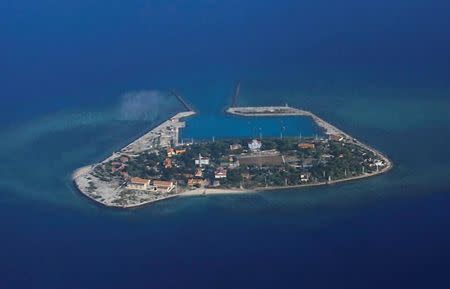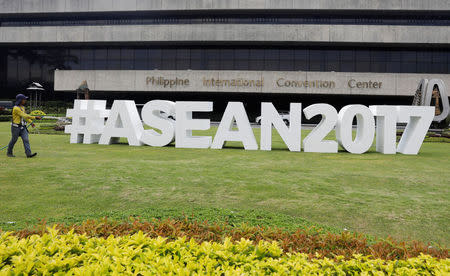ASEAN statement to go easy on Beijing over South China Sea dispute
By Manuel Mogato MANILA (Reuters) - Southeast Asian nations would adopt a softer than usual tone about South China Sea disputes at a leaders' summit on Saturday in Manila, and exclude references to militarisation or island-building, according to a draft of the chairman's statement. Although some Association of South East Asian Nations (ASEAN) leaders will express "serious concern" over the "escalation of activities" in the disputed sea, ASEAN will drop references, or even allusions, to China's construction of artificial islands and the military hardware it has placed on them, according excerpts of the draft seen by Reuters. The statement would be a watered-down version of that issued last year and comes amid a charm offensive by Philippine President Rodrigo Duterte, who takes the rotating ASEAN chair this year, to court China for its business and avoid rows over sovereignty in the South China Sea. However, a diplomat from the ASEAN secretariat told Reuters, that officials were still working on the draft of the statement and "it may still change" before it is issued at the end of the summit on Saturday. China claims almost entire South China Sea where about $5 trillion worth of sea-borne goods pass every year. Brunei, Malaysia, the Philippines, Taiwan and Vietnam also have conflicting claims on the strategic waterway. ASEAN references to the South China Sea issue typically do not name China, which has been expanding its seven manmade islands in the Spratlys, including with hangers, runways, radars and surface-to-air missiles. Last year's ASEAN statement in Laos emphasized the importance of "non-militarisation and self-restraint in the conduct of all activities, including land reclamation". According to the Asia Maritime Transparency Initiative, China will soon be capable of deploying fighter jets on three of its reefs. China insists its activities are for defence purposes and are taking place in what it considers its sovereign waters. The Philippines irked China two months ago when its then foreign minister, Perfecto Yasay, said he and ASEAN counterparts had noticed "very unsettlingly" that weapons systems had been installed, and considered that "a militarization of the region". The foreign minister of the former administration, Alberto del Rosario, on Tuesday said the Philippines' hosting of ASEAN summit was an opportunity for Duterte to raise China's militarisation. "We should utilise our leadership to be able to uphold the rule of law," he said. "The leadership of the Philippines will lose a lot of influence if we pass up that opportunity." A former government official involved in foreign policy likened the Philippines to Cambodia, which has been accused of taking China's side and serving as a de facto veto against consensus ASEAN decisions that would otherwise be unfavourable to Beijing. "Everyone is now watching the Philippines, we expect China to send its message to Southeast Asian countries through Duterte," the official said, requesting anonymity. "We are now acting like China's lackey." (Editing by Martin Petty and Michael Perry)

 Yahoo News
Yahoo News 

